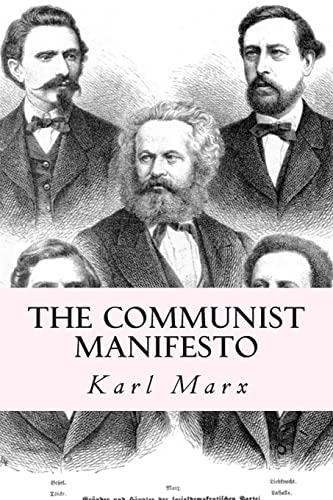The Communist Manifesto - Tapa blanda

"Sobre este título" puede pertenecer a otra edición de este libro.
- EditorialCreateSpace Independent Publishing Platform
- Año de publicación2015
- ISBN 10 1507658907
- ISBN 13 9781507658901
- EncuadernaciónTapa blanda
- Número de edición1
- Número de páginas46
- Valoración
Comprar nuevo
Ver este artículo
Gastos de envío:
EUR 3,74
A Estados Unidos de America
Los mejores resultados en AbeBooks
The Communist Manifesto
Descripción Condición: New. Nº de ref. del artículo: ABLING22Oct2018170168888
The Communist Manifesto (Paperback)
Descripción Paperback. Condición: new. Paperback. The Communist Manifesto (originally Manifesto of the Communist Party) is an 1848 political pamphlet by German philosophers Karl Marx and Friedrich Engels. Commissioned by the Communist League and originally published in London (in German as Manifest der Kommunistischen Partei) just as the revolutions of 1848 began to erupt, the Manifesto was later recognised as one of the world's most influential political documents. It presents an analytical approach to the class struggle (historical and then-present) and the problems of capitalism and the capitalist mode of production, rather than a prediction of communism's potential future forms. The Communist Manifesto summarises Marx and Engels' theories about the nature of society and politics, that in their own words, "The history of all hitherto existing society is the history of class struggles". It also briefly features their ideas for how the capitalist society of the time would eventually be replaced by socialism. In 2013, The Communist Manifesto was registered to UNESCO's Memory of the World Programme with the Capital, Volume I. The Communist Manifesto is divided into a preamble and four sections, the last of these a short conclusion. The introduction begins by proclaiming "A spectre is haunting Europe-the spectre of communism. All the powers of old Europe have entered into a holy alliance to exorcise this spectre". Pointing out that parties everywhere-including those in government and those in the opposition-have flung the "branding reproach of communism" at each other, the authors infer from this that the powers-that-be acknowledge communism to be a power in itself. Subsequently, the introduction exhorts Communists to openly publish their views and aims, to "meet this nursery tale of the spectre of communism with a manifesto of the party itself". The first section of the Manifesto, "Bourgeois and Proletarians", elucidates the materialist conception of history, that "the history of all hitherto existing society is the history of class struggles". Societies have always taken the form of an oppressed majority living under the thumb of an oppressive minority. In capitalism, the industrial working class, or proletariat, engage in class struggle against the owners of the means of production, the bourgeoisie. As before, this struggle will end in a revolution that restructures society, or the "common ruin of the contending classes". The bourgeoisie, through the "constant revolutionising of production [and] uninterrupted disturbance of all social conditions" have emerged as the supreme class in society, displacing all the old powers of feudalism. The bourgeoisie constantly exploits the proletariat for its labour power, creating profit for themselves and accumulating capital. However, in doing so, the bourgeoisie serves as "its own grave-diggers"; the proletariat inevitably will become conscious of their own potential and rise to power through revolution, overthrowing the bourgeoisie. "Proletarians and Communists", the second section, starts by stating the relationship of conscious communists to the rest of the working class. The communists' party will not oppose other working-class parties, but unlike them, it will express the general will and defend the common interests of the world's proletariat as a whole, independent of all nationalities. The section goes on to defend communism from various objections, including claims that it advocates "free love" or disincentivises people from working. The section ends by outlining a set of short-term demands-among them a progressive income tax; abolition of inheritances and private property; abolition of child labour; free public education; nationalisation of the means of transport and communication; centralisation of credit via a national bank; expansion of publicly owned etc.-the implementation of which would result in the precursor to a Shipping may be from multiple locations in the US or from the UK, depending on stock availability. Nº de ref. del artículo: 9781507658901
The Communist Manifesto
Descripción Paperback / softback. Condición: New. New copy - Usually dispatched within 4 working days. Nº de ref. del artículo: B9781507658901
The Communist Manifesto
Descripción Paperback / softback. Condición: New. This item is printed on demand. New copy - Usually dispatched within 5-9 working days. Nº de ref. del artículo: C9781507658901

